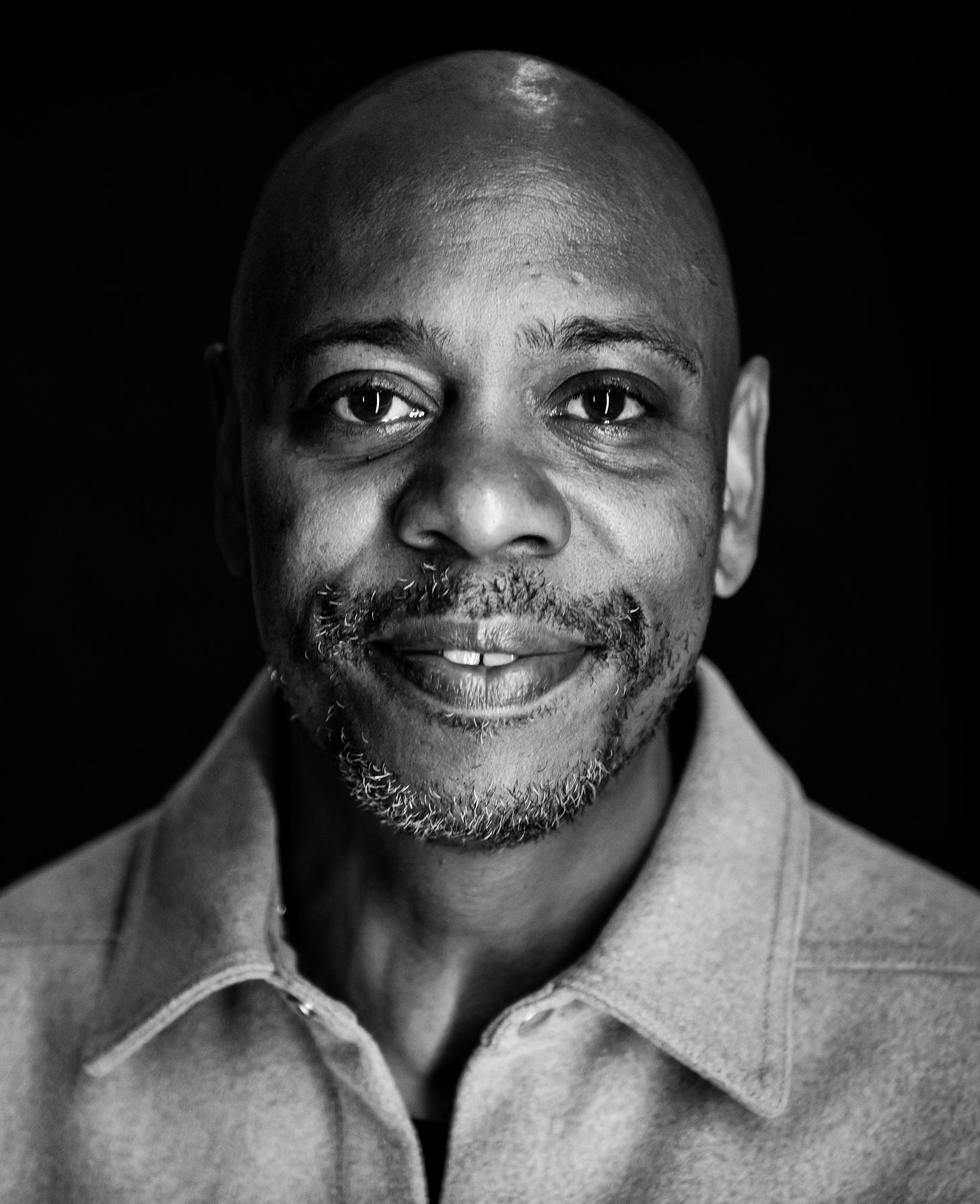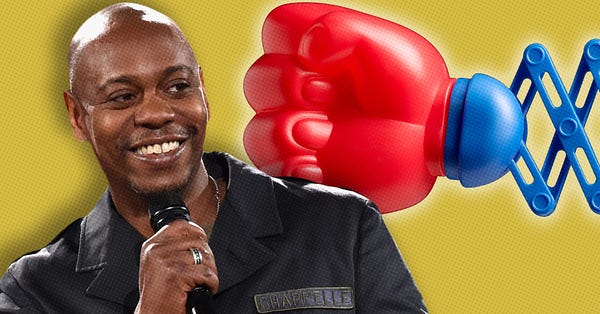Weekend reads: Comedians against comedy
Will Saturday Night Live writers boycott the greatest comedian of all time?
During the endless months of lockdown in Toronto, I took solace in Dave Chappelle’s stand-up. I was working in a newsroom, and conducting some of the hardest interviews of my life. Night after night, I turned to Chappelle’s comedy for comfort.
I watched his specials over and over again. Sometimes mindlessly, sometimes laughing on the couch, and sometimes paying close attention, trying to figure out why they helped so much.
Chappelle is, of course, no average comedian — he’s arguably the best one alive. He is in possession of almost super-human levels of charisma, which certainly helps. He’s also smart, curious, perceptive, courageous.
But the real key to his appeal, I think, is that he’s empathetic.
He pokes fun at our sacred cows with the understanding, as he notes in his final Netflix special, The Closer, that all of us — white or Black, gay or straight, rich or poor — are having a human experience. We are all struggling, in one way or another, to get through it. We are all in it together. And so there is a reassuring quality to Chappelle’s act, even when he’s engaged in what he calls “reckless talk.”
Comedy, it must be pointed out, is an art form that’s well-suited to periods of stress and overwhelm. Laughter provides physical relief, a bodily release of built-up tensions.
Comedy helps us break out of stifling situations, and periods of history. Comedy is about feeling free. It’s about the freedom to laugh, to question, to reject orthodoxies, to mock party lines.
Jokes penetrate our defences, pull down our walls. They foster connection, inviting us to commune with others who are also laughing.
And what we laugh at tells us things. Jokes reveal truth.
In the award-winning special Sticks & Stones, Chappelle made a comment that I can’t seem to shake.
I mean really, y’all, what the f**k are we doing? I can’t live in this new world you’re proposing.
I have thought about that line for years now. Late at night. First thing in the morning over coffee. Out walking the streets at dusk, blasting hip-hop in my headphones, trying to make sense of the day.
I can’t live in this new world you’re proposing.
I don’t want this world that’s being proposed right now, either.
I don’t want a world where I can’t ask basic questions about culture, or science, or politics, or the decisions of those in power. I don’t want to live in a world where narratives are pre-determined, and then performed. I don’t want to live in a world where there is no curiosity, no sense of discovery, no delight in the sparring of ideas. I do not want to live in a world where Twitter gets to tell me what to think.
Most of all, though, I do not want to live in a world without laughter.
I have returned to this again and again, as comedy becomes less funny, and more dogmatic. As comedians cater their jokes to the crowd online instead of the one in front of them, aiming for applause instead of laughter. As stand-up sets imitate a Twitter feed full of smug, sanctimonious punchlines.
None of these acts are even remotely funny, mainly because they are so predictable.
Humour is predicated on surprise, on the ability to say the thing that you’re not supposed to say. Comedy is about reorienting perspective, about suddenly seeing things through somebody else’s eyes. It is about shaking us out of conformity of thought.
Comedy hangs on shock, on the ability to speak the unspeakable. In laughter — that great, collective, joyful release — the audience unites as one. The unspeakable feels less scary, more manageable. We become less afraid of ourselves, and each other.
All of this is why comedy is a fundamentally optimistic genre. It reassures us that everything is going to be okay.
But for everything to be okay, we have to be able to joke about what is not okay at all.
I found myself mulling over all of this again this week, with some Saturday Night Live writers reportedly boycotting the show this weekend, as Dave Chappelle returns to host (backed up by legendary Brooklyn rappers Black Star as musical guests).
The boycott reports may not prove true, and may not be significant even if they are. (Dave Chappelle, for his part, apparently isn’t fussed.)
The Netflix staff walkout over The Closer, after all, turned out to be much ado about nothing. (But provided great fodder for a short documentary about two comedians who showed up to counter-protest. Their slogan? “We like jokes.” You can order the t-shirt here. I did.)
But given the fact that whenever Dave Chappelle makes headlines, controversy ensues, I want to send a clear message.
My message is simple: I like Dave. I like jokes. I want a world where both are celebrated.
With that, I’ll pass the mic to Canadian comedian Ryan Long.
Speaking of comedy, I had the pleasure of joining comedian, writer, and Spectator columnist Bridget Phetasy on her podcast Walk-Ins Welcome, for a wide-ranging conversation on hip-hop, journalism, and the culture wars. Do have a listen.
If you’re interested in comedy, you might also be interested in my interviews with British comics Andrew Doyle (of Titania McGrath fame) and Konstantin Kisin, or my interview with Ben Burgis, author of Canceling Comedians While the World Burns.







Great read in general. Thank you. That documentary is brilliant. I like jokes too!! Thanks Tara!
Yes, i also don't really want to live in the kind of world you describe. And that includes living in a world of SARS-CoV-2 scare narratives (which seem to be increasing in quantity right now). i don't really want to live in a world where mask wearing becomes normalized, and where our default relationships with others are governed by seeing the other as a "threat" to be "protected from."
Yet i don't really see a way out. i wonder if this is simply liberalism working itself out (see Patrick Deneen's book on Why Liberalism Failed), and there won't be much of a shift (if any) until something new emerges. To be clear, i don't understand this as defeatism or "pessimism." i just don't see any other way to go if our dominant philosophical anthropology consists of being autonomous individuals seeking their own self-interest (which includes identity). Until we are able to recover something from the past about the importance of character and virtue - which also includes ending modernity's inherently hostile relationship with the past - this seems to be a logical trajectory.
What we need to do in the meantime is develop small, local, sustainable friendships and ways of living that help us to be sane again. And this includes laughter - which is why i was so grateful, Tara, for what you did here. The link you provided to the Ryan Long comedy piece is so what we need right now in the interim. These are the kinds of things that can help us stay sane and hopeful as we stumble toward a sustainable and friendly future.
Thanks again for this work, Tara.